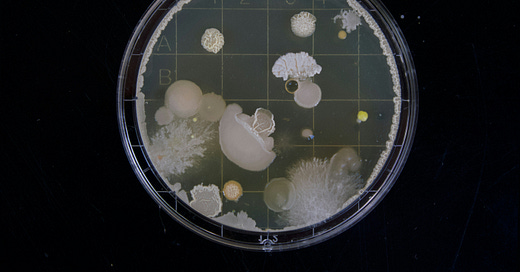Scientists are Learning More About Bacteria in Space
We know they mutate and breed faster in space than on Earth, and now new species are being found thriving on space stations.
Hiya!
I saw "War of the Worlds," starring Tom Cruise and Dakota Fanning, when it was released in 2005. Now, I’m reading the book it was based on, written by the influential author H.G. Wells. Published in the 1890s, the sci-fi novel was one of the earliest to explore the concept of an alien invasion of Earth, specifically from Mars.
It’s a story I love, not for the battles or fear factor, but because of its ending. Spoiler alert: it’s not humans that defeat the Martians, but bacteria. The idea that bacteria could be the downfall of an alien invasion tickles my brain, which is perhaps why I was drawn to a recent article about bacteria and space that led me down a rabbit hole, taking me back to 2016.
2016
For a 2016 study — by Project MERCCURI, a collaboration between researchers at NASA, Space Florida, SciStarter, Science Cheerleader, and the University of California Davis — researchers collected microbes from historical monuments, museums, schools, a spacecraft, and sports teams. Then, they sent the samples to the International Space Station (ISS) to observe how they’d respond to the conditions in space.
In a news release, lead author Dr. David Coil, a microbiologist at UC Davis, said many people ask why they’d send microbes into space at all, and he explained:
”Understanding how microbes behave in microgravity is critically important for planning long-term manned spaceflight but also has the possibility of providing new insights into how these microbes behave in human constructed environments on Earth."
After analysis, the researchers concluded that almost all of the microbes behaved similarly in space as they do on Earth, except for one.
One species of bacteria, Bacillus safensis, initially collected from NASA’s Perseverance Rover before it launched in 2004, grew an astonishing 60 percent better in space than on Earth.
Scientists were unable to explain why this bacterial strain would thrive in space, but the discovery went on to inspire future research.
2017
The 2016 study motivated Madhan Tirumalai, a postdoctoral fellow at the University of Houston and a member of the NASA Astrobiology Institute at the time. He theorized that there must be something about the weightless environment of space that the microorganism likes.
So, he conducted the most rigorous study of its time to investigate bacterial growth in microgravity, which was published in the science journal NPJ Microgravity.
In it, Tirumalai, now an Assistant Professor in the Department of Biology and Biochemistry at the University of Houston, and his team monitored Escherichia coli (E. coli) cells in lab-simulated microgravity conditions for 1,000 generations of growth (for reference, one generation takes as little as 20 minutes).
By the end, the team made three remarkable discoveries: that the bacterium spread significantly faster, evolved at least 16 unique genetic mutations throughout the generations, and grew almost three times as many colonies as the control bacteria that weren’t in microgravity.
The researchers removed some of the cells from microgravity after 10, 20, and 30 generations, and found that up to 72 percent of the supercharged bacteria retained their growth advances. Such a finding suggests that some mutations induced by space travel may be permanent, even after returning to Earth.
George Fox, a Professor Emeritus and astrobiologist at the University of Houston, told Leah Crane of New Scientist,
"We are, in fact, seeing true genomic changes – permanent changes. Next we need to figure out exactly what those changes are doing."
After all, space tourism has already begun. If billionaires like Elon Musk, Jeff Bezos, and Richard Branson, along with their respective companies, SpaceX, Blue Origin, and Virgin Galactic, have their way, space tourism will soon become a booming industry.
And what better avenue for mutated bacteria to return to Earth than to hitch a ride on any one of the routine spaceships full of tourists?
Thankfully, Tirumalai and his team found that the mutated bacteria perished just as quickly in response to antibiotics as the unaltered Earth-bound E. coli. However, that may not always be the case.
After all, a bacterial species may evolve into an entirely new species that resists typical antibiotics after spending a significantly longer time in microgravity conditions — which is precisely what scientists discovered next.



